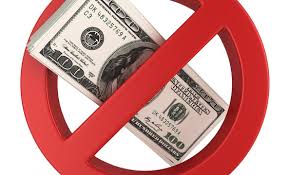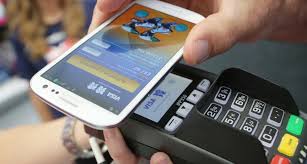Cash Is Becoming Endangered Specie
Ask yourself: When did you last pay with greenbacks? Jan 28 2019
If you have paper money and coins lying about the house, you might be wise to unload them next time you shop — that is, if you are able to. Ever more retailers are refusing to accept specie. They want to be rid of the nuisance of sorting paper and coin into the cash drawer and out of it again to make change. They want an end to trips to the bank to deposit cash while at the same time having to take back paper and rolls of coins to make that change.
On the road to a cashless society, the U.S. is well behind. We have consistently lagged other countries in modernizing payment systems — chips in credit cards, a European innovation, being a prominent example. Other countries are moving ahead with deliberate speed. Sweden is the front runner in going cash free. Many of their stores no longer accept it. Neither do the country's buses. Banks no longer dispense cash and accordingly have junked their ATM machines. Denmark and Norway are following close behind.
The credit card was an American invention but Europe has pushed the technology further than the U.S. As effective monopolies Master Card and Visa dragged their feet rather than incur the costs of technological conversion. Increasing incompatibility with the rest of the world and a high incidence of fraud from easily compromised credit card magnetic strips forced adoption of the more secure chips embedded in cards.
over thereWell over a decade ago mobile hand-held devices for accepting credit card payments became the norm in Europe. Ready to pay in a restaurant? At table, your waiter inserts your credit card into his or her device, (technically known as a terminal), perhaps has you type in your pin number, and the small machine not only handles the electronic transaction wirelessly, but prints the bill, the ticket for you to sign, and your receipt. That's now old technology, but not here. In this country the practice all these years later is still for the waiter to go back and forth to the desk with card and paper while you wait.
Europe and Europay — their Master Card and Visa — have taken the technology further. If you've got the app for it, you can simply tap a card against such a device to transfer card information and complete a 
transaction. Or tap your phone against it, if you have upgraded further. These moves toward maximal convenience make clear that paper and coins are headed toward obsolescence.
Innovators in the U.S. have concentrated on peer-to-peer money transfers, developing Square Cash, Venmo, Google Wallet, Apple Pay and Messenger with which people can use their phones to make payments in stores or to friends but payment by phone is nowhere near as widespread as in Europe.
Or in China, which could reach the cashless finish line ahead of Sweden. Given its population size, it is the largest cashless market in the world, but with a difference. The Chinese largely bypassed credit cards and are instead 
zealots for QR codes. Their mass adoption means that the Chinese can pay for virtually anything by using WeChat — the biggest player — on their phone to scan a merchant's or a friend's QR code. From the "wallet" of money the customer has deposited at WeChat, the scan causes payment to the account data embedded in the QR pattern — a merchant's, a friend's — that your phone is scanning. Or a friend can reimburse you for lunch by scanning your personal QR code on your phone to send money to your WeChat account. Apps for generating one's own code are available online.
India has made clear its intention to go cashless, and offers a broad selection of digital payment methods. In the first half of 2018 there were 11.8 billion digital transactions in the country. One motive of eliminating cash is to drive out corruption. In 2016 Prime Minister Narenda Modi took the drastic step of demonetizing the country's 500 and 1,000 rupee notes favored by corrupt politicians and criminal elements much as packets of the U.S. $100 note are the world's favorite. But Modi's move was too soon. Declaring that those currency denominations would no longer be honored by the banks caused a cash shortage crisis enough to knock points off the country's gross domestic product for the year.
Kenya is notable for going straight to digital payments, leapfrogging banks and credit cards with its M-Pesa system (pesa is Swahili for money). Users deposit money via a vast network of storefront agents into an account stored on their cell phones. Using text messages secured with a pin, they can then transfer money to people and merchants. By its 10th anniversary in 2017, Kenya's invention had spread to 10 countries and is in use by 30 million people.
drawbacksThe concern for going cashless in the U.S. is that 7% of households have no bank affiliation — "unbanked" is the term. A further 19% are classified as “underbanked,” meaning they rely on services outside the banking system such as payday lenders and pawnshops. Elimination of cash would more severely marginalize an underclass consisting of immigrants, the elderly, and the poor. Walmart, for one, recognizes the problem. It converts cash to prepaid cards that customers can use where cash is not accepted.
Lawmakers have taken steps to protect those lackig payment facilities. Merchants in Philadelphia and Washington DC have been banned from going cashless. It was tried in Chicago but was voted down. Massachusetts foresaw the problem long ago. The state has had a law against refusing cash that dates from 1978.
But that goes in the opposite direction. To prepare for what is the seeming inevitable move away from cash, the country will need to modify its laws, starting with disallowing banks from turning away applicants they consider undesirable. Workers must have accounts somewhere if employers are to pay only by direct deposit. Fees charged for use of debit cards drawing against those deposits must be mandated at closer to zero.
If cash becomes hopelessly old-fashioned, at least we'd see the disappearance of tip jars in stores. Merchants will be forced to pay proper wages to their staff instead of expecting us to chip in. But how do we tip the plumber who comes on a Saturday to fix the overflowing toilet if there are no more $20 bills? It's obvious. We'll probably just tap his phone with our phone.
Please subscribe if you haven't, or post a comment below about this article, or
click here to go to our front page.


CASH represents FREEDOM!
Digital represents SLAVERY!
You choose!
My husband and I use cash for many things, and don’t understand the use of aps. We are both in our 70s. There are many people our age who are the same–cash is quick, anonymous, and easy. We would be very sorry to see it disappear. When I see people pulling out a credit card to pay for a cup of coffee, I think it is ridiculous. We pay for our cleaning lady, tips, cabs, and small purchases with cash. It is so much easier than having to master all the techie stuff and then having that not work, as it frequently doesn’t!
I know we are dinosaurs, but we are happy dinsouars. We also use checks, especially to make donations, as it is so easy to keep records, as opposed to
going through a credit card statement to figure out what is what.
Dittos! There is nothing like cash and the change jar I keep to empty my pockets of change. (also a kind of savings). Cash allows for personal control of purchases. Just think, what if The “elites” in Washington decide to take over the banking system something perfectly plausible under the current political attitudes, the government will be in full control of how our money is spent – the stores already know our shopping patterns so there is only a very small step to such a scenario. No, I am not paranoid or a conspiracist, but I keep myself informed of the goings-on Congress!